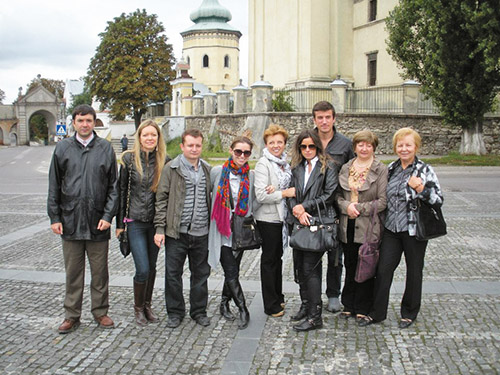
I keep on staring at the images: photos of women and children, luggage at the Lviv train station. They are waiting on the platform to go west to Poland, away from the Russians, the sirens, the missiles. I am transported back to another time at that same train station. At 6 years old, I was running in circles around the luggage. It was 1985 and my family was leaving the Soviet Union.
My Ukrainian aunt, Mirosya Prokopyshyn, calls Putin a fascist. My 35-year-old cousin Olia Tuchapska does not know whether to stay in Lviv or flee to Poland. Her son, Max, is the same age as my son: 7 years old. She has just had surgery. She stays because her husband has to stay and she has no intention of abandoning him, even if her sister-in-law is in Poland, even if my own sister sponsors her visa to the U.S.
My aunt, uncle and cousin spent the night in their apartment building’s basement. (Their apartment building is over 100 years old and contained hidden compartments where people hid when the Nazis invaded Lviv in 1941.) Underground parking garages in Lviv have been turned into bomb shelters. Refugees from Kyiv, Kharkiv and the East crowd into the city. My cousin informs me, matter-of-factly, that there are no apartments to rent. People wait in lines for food, money and gas. My family intends to stay in the city, for now. Their alternative plan is to go to distant relatives who live in villages on the outskirts of Lviv if the bombs/missiles start to rain down.
I think about my male cousins, both professors of mathematics at university. Will they pick up arms? They are mild-mannered intellectuals. I think about my aunt, stockpiling provisions and salting meat in order to preserve it.
Israel had sent diplomats and planes to Ukraine, preparing to airlift the Jewish population to Israel. But the majority seem to be staying. Putin is not Hitler, notwithstanding the memes and mustaches of social media. And yet. Sara Rigler wrote a piece for Aish comparing the reluctance of Ukrainian Jews to flee to that of Elie Wiesel’s family who failed to heed the advice of a non-Jewish servant to hide in advance of the Nazis.
Ukraine is a paradox. On the the one hand, Ukrainians collaborated with the Nazis in murdering their Jewish neighbors during World War II. There is a long and complicated history of Ukrainian nationalism tied to antisemitism. Ukraine’s national heroes (Stephan Bandera and others) were rabid antisemites. On the other hand, Ukraine of 2022 is not the bloodland of the past. Several Jewish communities flourished post Soviet rule in Ukraine, and President Zelensky is Jewish. (The Atlantic proclaimed, “How Zelensky Gave the World a Jewish Hero.”) In fact, a 2019 Pew Research Center poll found Ukraine the least antisemitic among all Central and Eastern European countries.
Friends who know my background text me to ask about my family. My immediate family is safe in the tri-state area. But my extended family is stockpiling food and spending nights in bomb shelters. Why doesn’t my extended family leave? Why don’t the majority of Ukraine’s Jews leave? Why didn’t President Zelensky’s family leave when 1.5 million Soviet Jews immigrated to the United States and Israel in the 1990s? He found a life in his land. They have lives. The Chabad shluchim are staying in Ukraine, the exodus to Moldova notwithstanding. Moreover, consider the growing elderly population. How easy is it to flee at 80 years old?
My family immigrated to the United States to escape antisemitism. My father wanted more opportunities for himself and his family. Today’s Jewish refugees are fleeing from the Russians and Putin rather than antisemitism. And yet there is the specter of antisemitism. Moreover, I was able to leave because of American Jewry advocating for Soviet Jewry. It is time to pay it forward and help Ukrainian Jewry, in whatever form they need it.
Sophia Sapozhnikov-Lewis resides in Teaneck with her husband and three children. She has been an English teacher at the Bronx High School of Science for over 15 years.
By Sophia Sapozhnikov-Lewis









